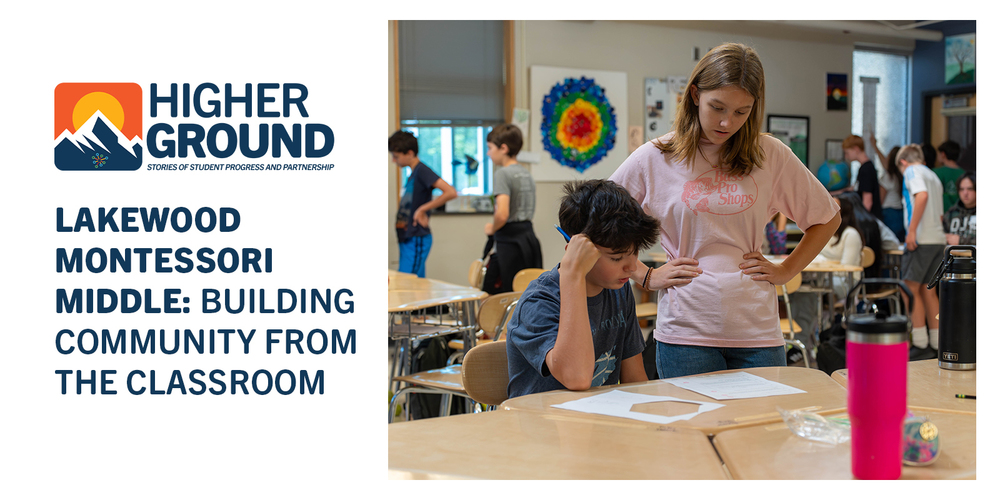At Lakewood Montessori Middle School, when the school bell rings, learning may begin within the classroom but there are planned as well as ubiquitous lessons here. Whether it’s a sixth-grade trip to the Duke Lemur Center or a weeklong adventure at Camp Don Lee, students are out in the world—learning, observing, connecting, and applying their lessons in real time.
“Doing things out of the box is what makes us stand out,” says Principal Shea Neville, who started his career as a teacher assistant, and now has a background in both counseling and Montessori education. “We’re asking students to engage with their community and learn how to use their independence for good.”
This year’s data release showed that Lakewood Montessori Middle was in the top 20 percent of the state’s 2590 schools for academic growth; they also achieved this status in 2023-2024. Additionally, Lakewood Montessori exceeded growth expectations last school year.
Neville says this school community works extremely hard to achieve its goals.
A Community That Learns Together
Lakewood’s approach to education is organic, not “sit and get” said Neville. Teachers design and facilitate lessons that encourage dialogue, reflection, and collaboration. Students discuss assignments with peers, test their thinking in conversation, and develop metacognition—the ability to think about their own thinking.
“It makes learning more social, not just something that happens in isolation,” he said.
As students move from elementary school into middle school, Lakewood builds on the Montessori foundation of self-direction and accountability. Student-led conferences replace traditional parent-teacher meetings, giving scholars a chance to showcase their progress, reflect on their goals, and take ownership of their learning. Teachers clarify, but students lead.
Parents, in turn, see and feel that ownership. “Our families recognize the authenticity of what’s happening here,” Shea notes. “It’s not performative—it’s intentional.”
Teaching Independence With Intention
What may look like unstructured independent work is, in reality, the result of careful planning and explicit instruction, according to Assistant Principal Catherine Emily Simler. She brings to Lakewood a wealth of experience as a middle school English teacher in Harlem, New York and served as an AP intern before becoming the school’s full-time permanent assistant principal. Teachers model learning through the I do, you do, we do framework, then guide students through stages of mastery.
The classrooms buzz with energy. Multiple adults—teachers, assistants, and support staff—work side by side, keeping learning active and inclusive. Teachers are deeply invested in their craft. “There’s nothing better than a good teacher in a classroom,” Shea says. “That’s been the magic.”
The Montessori Mindset
All core teachers at Lakewood are encouraged to pursue Montessori certification—an intensive 200-hour program often compared to a master’s degree. The investment reflects both professionalism and passion. “The buy-in starts with the love of pedagogy,” Shea says. “It’s communicated through the way teachers teach, the way they treat students, and the way parents see it.”
They’re committed and rarely absent, said Neville. “Our teachers don’t want to be out,” he said.
The Montessori philosophy emphasizes respect, reflection, and relationship. “It’s an effective style that really wins students over,” says Neville, noting the particular impact on African American and Hispanic boys who might otherwise feel disconnected from traditional schooling.
Preparing for Life Beyond Middle School
At Lakewood, academic lessons are just part of the preparation. Students practice public speaking, research, and social etiquette—skills that help them compose themselves in any situation. They explore career and technical education, participate in band, chorus, and art, and learn to manage the emotional and physiological changes that come with adolescence.
Faculty members remain flexible and compassionate, recognizing that middle school is both a short tenure and a pivotal bridge. “This is where students learn executive function—how to plan, manage, and take responsibility,” Shea explains.
Behind the scenes, a network of support staff keeps the school community strong: counselors who do what it takes to keep students in , a calm and steady MTSS coordinator, a librarian who steps beyond her title, and a Spanish and community liaison who ensures every family feels seen and heard. “She’s our cultural gem,” Simler says. “She makes sure no one feels unseen or unheard.”
Even wellness is woven into the school culture—whole foods, fruits, nuts, and water reinforce a “whole child” approach that prioritizes both mind and body. “You don’t need extrinsic rewards here. You've got it right in front of you. That’s the treat.”
At Lakewood Montessori Middle, the goal isn’t compliance—it’s growth. Students are expected to rise to the occasion, and more often than not, they do.
“It’s about creating the expectation and then watching them rise to meet it,” says Neville.

